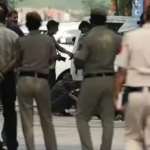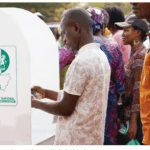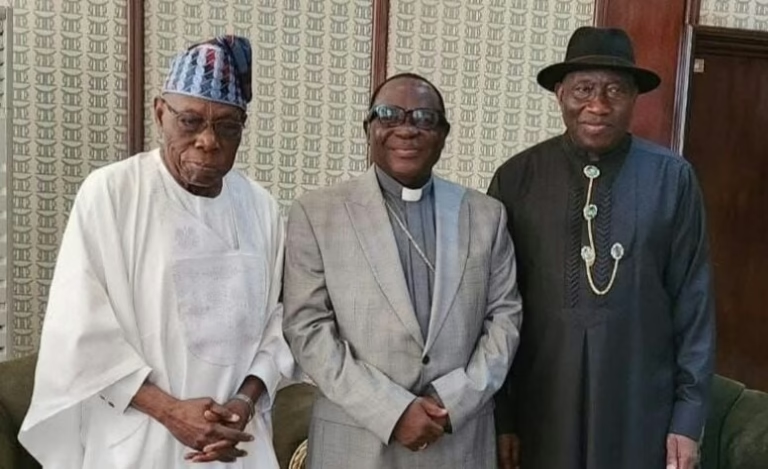Prominent African leaders and veteran statesmen have issued a grave warning about the potential disintegration of democracy across the continent unless immediate and well-planned interventions are undertaken by all relevant parties.
This urgent message emerged during the Democracy Dialogue hosted by the Goodluck Jonathan Foundation in Accra, Ghana, where current and former heads of state convened to deliberate on the future of democratic governance in Africa.
Among the distinguished participants were Nigeria’s former presidents Chief Olusegun Obasanjo and Goodluck Jonathan, alongside Ghana’s President John Dramani Mahama.
The event also featured contributions from Dr. Omar Touray, President of the ECOWAS Commission, and Bishop Matthew Hassan Kukah of the Catholic Diocese of Sokoto.
The gathering was prompted by growing international concerns over the erosion of democratic principles and the weakening of institutions amid rising authoritarian tendencies.
Chief Obasanjo, who chaired the session, emphasized that without significant reforms, democracy as it currently exists is on a path to collapse.
He reflected on the original essence of democracy, famously defined as government “of the people, by the people, and for the people,” and lamented how this ideal has been distorted over time.
“Democracy is perishing because it resists necessary reform,” Obasanjo asserted. “The traditional understanding of democracy must evolve in its context, substance, and application if it is to survive.”
He expressed deep concern that the internal practices of democracy are undermining its very foundation.
“The greatest threat to democracy is the way it is currently executed,” he warned. “Fundamental democratic principles are being neglected or corrupted, resulting in a system that fails to deliver on its promises.”
Obasanjo further stressed that without reform, democracy will not only falter but ultimately perish.
Despite its shortcomings, he maintained that democracy remains the best form of governance available, cautioning against simplistic interpretations that equate democracy solely with majority rule.
“If democracy is reduced to the rule of the majority, what happens to the minority? Are they excluded from the people?” he questioned, highlighting the dangers of marginalization and lack of inclusivity.
Former President Goodluck Jonathan echoed these concerns, underscoring that leaders who do not fulfill their duties should be removed through fair and transparent elections.
He identified electoral fraud as one of the most significant threats to democratic stability in Africa and warned that without comprehensive reforms, democracy on the continent is at risk of collapse.
According to a statement from the Goodluck Jonathan Foundation’s communications officer, Mr. Wealth Dickson Ominabo, Jonathan emphasized that when democracy fails to meet citizens‘ expectations, it creates fertile ground for authoritarianism to take hold.
“Leaders must commit to a form of democracy that secures a promising future for the next generation, where every voice is heard,” Jonathan stated.
He elaborated, “Democracy in Africa is under immense pressure and faces the danger of collapse unless all stakeholders unite to rethink and reform it. Electoral manipulation remains a critical challenge.”
Jonathan called for a reassessment of electoral systems, noting that many leaders exploit these processes to cling to power against the will of the people.
“If elections were conducted properly, ineffective leaders would be voted out. Unfortunately, the system is often manipulated to entrench those in power,” he explained.
He highlighted the aspirations of African citizens for freedom, meaningful voting rights, fair representation, quality education, security, healthcare, employment, and dignity. When these needs are unmet, public disillusionment grows.
Jonathan also praised the increasing involvement of youth in governance but stressed that young leaders require the guidance and wisdom of experienced elders to succeed.
President John Dramani Mahama of Ghana added that democracy’s survival depends on active efforts by Africans to safeguard and enhance it.
“Democracy cannot endure without our commitment. We must reset governance to prioritize accountability. Those who serve must answer to the people. Citizens are weary of corruption, poor governance, and lack of opportunities,” Mahama remarked.
He called for strengthening institutions, promoting development, and educating citizens as essential steps to revitalize democracy.
“Protecting the media and civic space is crucial. A free press acts as democracy’s defense mechanism,” he noted.
“Democracy falters when citizens lose trust, when leaders forsake integrity, and when institutions fall prey to capture. Yet, it can be revived when people stand up to defend it,” Mahama concluded.






















